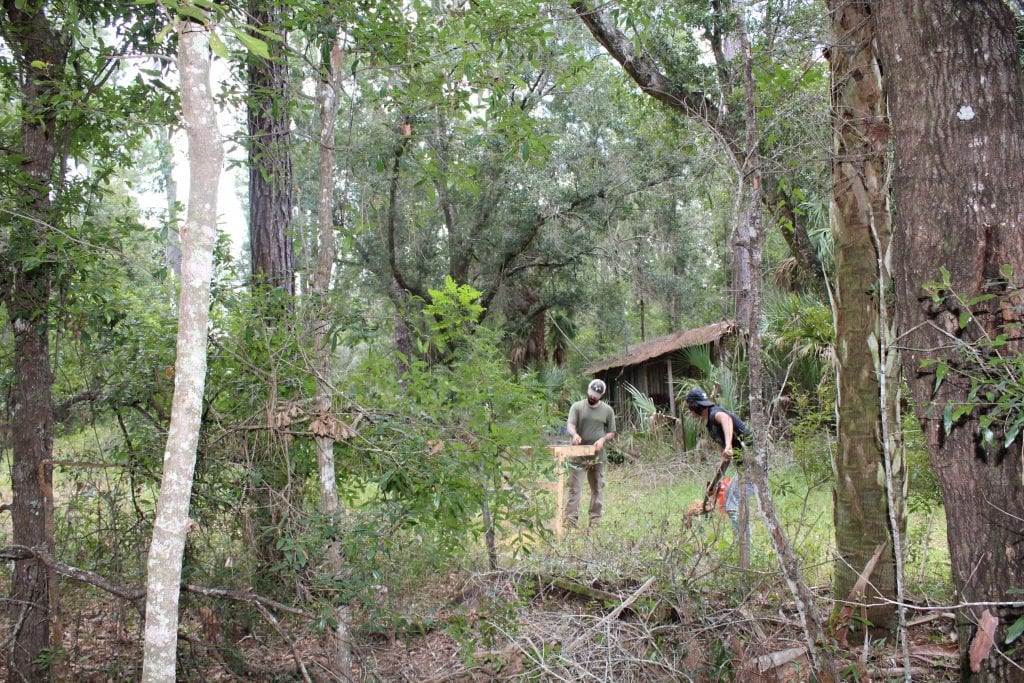Digging Up Rosewood

Students completing test excavations at one of Gonzalez-Tennant’s sites in Rosewood.
Anthropology visiting lecturer Edward Gonzalez-Tennant, Ph.D., spent the last decade of his life researching what happened almost a century ago in Rosewood, Florida. The recent release of his book, The Rosewood Massacre: An Archaeology and History of Intersectional Violence, and the last remaining house from Rosewood that was just put on the market, have brought the town back into public light.
“Seeing it come back into focus is inspiring, and I hope that I can do the complex history justice by discussing it,” Gonzalez-Tennant said.
Rosewood was a thriving African-American community founded before the Civil War in Levy County, Florida. In the beginning of 1923, a woman’s allegations incited a week-long riot that displaced its residents and burned the town to the ground.
Like many people, Gonzalez-Tennant didn’t know about the town until the release of the film Rosewood in the 1990s. When it became the focus of his dissertation in 2008 while studying at the University of Florida, he discovered that he was the first student at the university to write a thesis or dissertation on Rosewood and the events of 1923.
“Rosewood appealed to my desire to combine social activism with a scientifically-informed analysis of race relations in American history,” Gonzalez-Tennant said. “I was also interested in drawing on the inherent multidisciplinary nature of anthropology”

The aftermath of Rosewood, from a newspaper article dating to 1923.
While writing the book, he focused on integrating the local story of Rosewood to other similar instances of violence and the overall history of the US. For Gonzalez-Tennant, knowing the past is necessary to make sense of the present. He also integrated current topics such as the Black Lives Matter movements to connect the past and present.
“Understanding the historical roots of this allows us to understand what was done in the past, what worked and what failed, and perhaps provide more permanent solutions for the present,” he said.
As part of his research, Gonzalez-Tennant kept his work available to the public, frequently giving public talks and interviews to residents.
“I have found that an open, public, and transparent approach to my work has produced mostly positive results,” he said. “While some landowners prefer not to let us on their properties, others have approached me precisely because I’ve made my intentions public for more than a decade.”
Recently, the last original house from Rosewood was put on the market for sale. Known as the Wright house, it was used by the owner to shelter residents of the town running away from the turmoil.
Since it went up for sale, several descendants of Rosewood advocated for the house to be turned into a museum commemorating the events. Gonzalez-Tennant hopes the house can be turned into a local history museum, incorporating the town’s history as well as the riot.
Gonzalez-Tennant first became interested in anthropology during his undergraduate education at the University of Arkansas where he participated in a local archeological field site.
“Having the opportunity to explore local archaeology made all the difference to me as I was a first-generation student who could not afford an expensive international experience,” he said.
Now, he’s providing those same opportunities to UCF students by allowing them to go to Rosewood with him for archaeological fieldwork.
“These are all students I’ve had in my classes and they have bright futures in anthropology,” he said. “I have found a very supportive group of colleagues in the Department of Anthropology, some of whom have agreed to work with me in Rosewood.”
